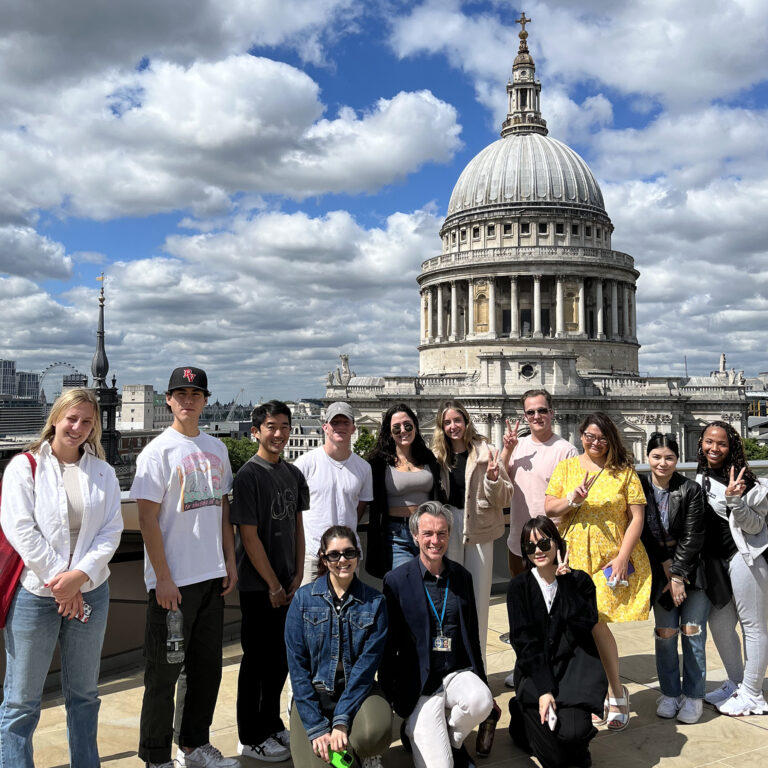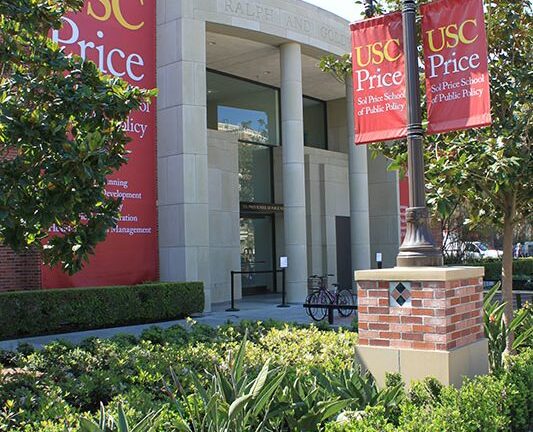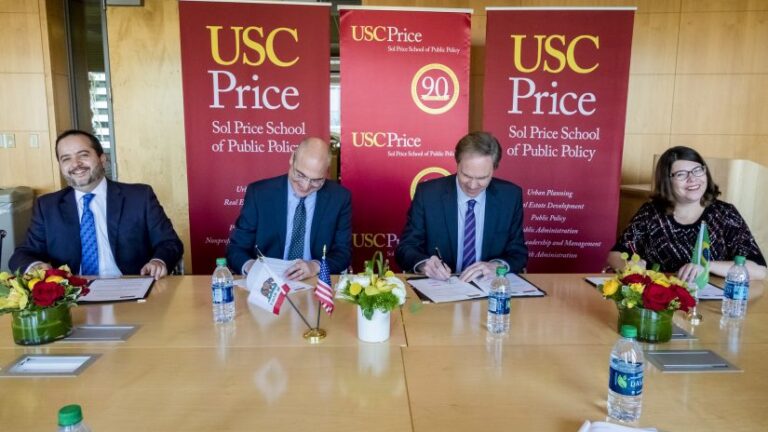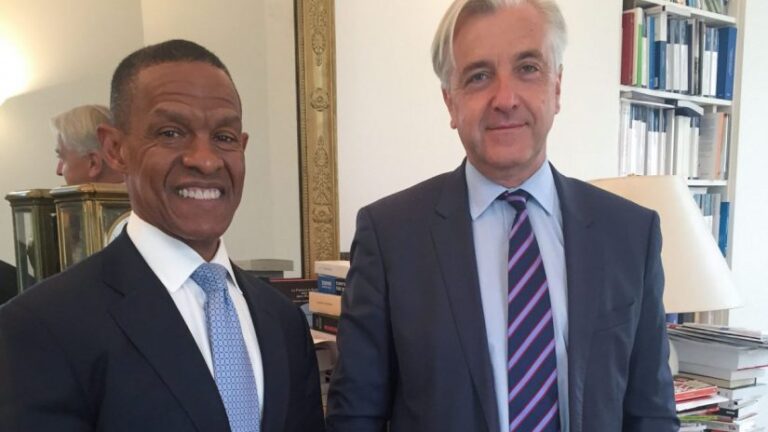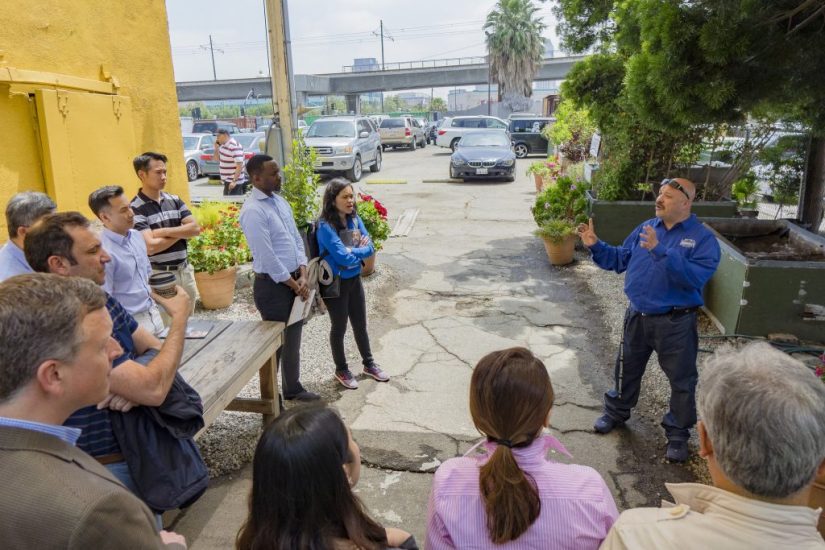
Global MPP students tour Homeboy Industries as part of a day centered around social justice lessons. (Photo by Deirdre Flanagan)
New Global MPP brings together diverse cohort, expands views on shared challenges
The new Master of Global Public Policy (Global MPP) is an innovative joint degree with the USC Price and Hong Kong University.
Professionals from around the world seeking a global and comparative perspective on policy challenges in today’s interconnected society spent a week at USC in June, as part an L.A. residency program that officially marked the start of the new Master of Global Public Policy— an innovative joint degree with the USC Price School of Public Policy and Hong Kong University.The Global MPP offers a hybrid format with five week-long residencies in Pacific Rim cities over 15 months, with online instruction in between. This provides needed flexibility for the students, many of whom are working professionals with five or more years of experience.
The 16 students – half from Asia, with others from Europe and North America – ventured into the city to meet with leading policymakers and practitioners for site visits and guest lectures that fueled the classroom discussion.
“We embedded our students in the living laboratory of Los Angeles – a polyglot, polycultural, polycentric metropolis of 18 million people – famous for Hollywood and beautiful beaches, but also innovative approaches to intractable social problems,” said Richard Parks, the program’s executive director.
Experiential education
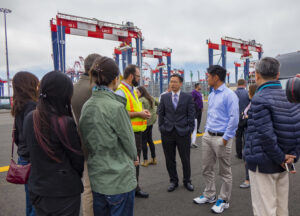
The residency included 50 hours of classroom time. Among the classes, USC Price Professor Antonio Bento and Hong Kong Professor Geng Xiao led their course, “Global Policy Challenges and Solutions;” Hong Kong Professor and USC Price graduate Pengyu Zhu taught “Quantitative Methods for Public Policy;” and Hong Kong Professor Danny Lam served as the instructor for “Art and Craft of Policy Analysis.”
“It’s different because in the MPP, when I’m not in the classroom, I’m not teaching,” said Bento, who served as an academic coordinator to help develop the curriculum and attended nearly every hour of programming. “Here with them for a week, there are moments of formal teaching but a lot of learning comes from debriefing informally, whether on a bus or at dinner. Beyond the classroom, we’re also engaging in more of a discussion-based learning where their experiences are part of the overall learning package.”
The residency had five themes, with a full day devoted to each one: climate change and adaptation; policy and legal frameworks around climate change and adaptation/clean air policy; social justice; data-driven social change; and urbanization.
“We wanted to look at innovative models of public policy in each of these different realms, both in terms of people advocating for and developing public policy, and getting public policy passed and implemented,” Parks said. “Our social justice day was very impactful particularly for our students coming from societies that are not democratic. Seeing the effectiveness of grassroots community organizing was provocative and hopeful for us all.”
Each day had unique and interactive trips and speakers. For climate change, students toured the Port of Long Beach and heard from various officials at the port. On the topic of social justice, they toured Homeboy Industries and learned how the nonprofit helps provide training and jobs to previously incarcerated men and women, and former gang members.
USC Price Professor Gen Giuliano, director of the METRANS Transportation Center, spoke on data-driven social change. The students went to City Hall to hear from Lilian Coral, chief data officer for the City of Los Angeles, and heard from the chief innovation officer for LA Metro, Joshua Schank.
‘Opening minds’
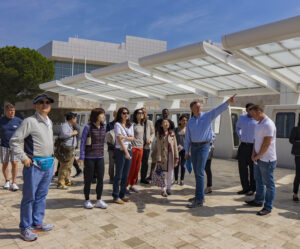
“This is really new and innovative, and I wanted to be part of the first cohort,” said Stephanie Nguyen, a Los Angeles local. “For the first time in my life, this is a program that exceeded my expectations. It made me reflect on how I have to operate in areas I know nothing about, with cultures I know very little about.”
Nguyen commented on the social dynamics of the group, and how being around people of other cultures was a learning experience in itself.
“To do this with people from a different side of the world made it that much more interesting,” she said. “One night, I learned about 1,000 years of China’s history. And then at Homeboy Industries, the Chinese cohort discovered how their gang culture is so different.”
Chuck Siu grew up in Hong Kong, studied in Canada and then returned to Hong Kong, where he is a finance professional in business planning and performance management. He came to the program to get a different perspective on how to be a business leader in the 21st century.
“This program talks about the problems everyone is facing and where we can come together to build solutions,” Siu said. “The L.A. residency really opened my mind up to how corporations, the private sector, public sector and government can work together better to formulate solutions for our communities. As a global citizen, I think it’s important to be cognizant of the world today before we pass judgment and make decisions.”
The North American participants will get to experience Chinese culture and policy issues in the next three residencies, which take place in Shanghai, Beijing and Hong Kong. USC Price faculty making one of those trips will include Gary Painter, Jennifer Miller and Bento.
When the students return to Los Angeles for their final residency, they will present capstone projects focused on the development and integration of China’s Pearl River Delta Bay Area as a rival to Silicon Valley.
Bento noted that while the initial offering has three visits to China, he envisions future residencies in places such as Mexico City, India, Europe and parts of Latin America.
“The Global MPP is training leaders worldwide to develop more effective, just and sustainable solutions for cities and regions while successfully navigating policy risk in a rapidly changing world,” he said.
